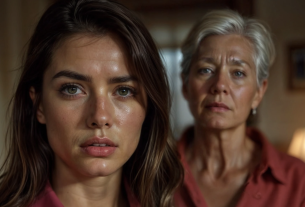Kirill watched as droplets slowly fell from the IV drip. It seemed to him that along with them, his life force, determination, and resilience were seeping away. Just a little more—and he would simply close his eyes so that he would never wake up again. That was exactly how he felt: completely drained and exhausted. He was overwhelmed by everything that was happening. The diagnosis given by the doctor just a few hours earlier had become the final straw.
Does he have a chance? Most likely not. And the doctors were just doing their job, trying to calm their patients—what else is there to do in such situations? But Kirill shook his head. What thoughts were crossing his mind? No, it wasn’t all so bad. He had a chance. The doctor had said so— a small chance, but a chance nonetheless. And Kirill would survive.
However… Everything would depend on his family. His wife and children were about to arrive. They hadn’t shown up for a week, but now they had to come to hear important news and support him. Kirill had always adored his wife Alena and loved his children immeasurably. They always got everything they wanted from him. Now it was their turn—to support him.
Kirill tried to smile, but his heart was still troubled. Strange premonitions didn’t leave him, as if something bad was about to happen. Kirill dozed off.
He was awakened by a nurse who had come to remove his IV. And a quarter of an hour later, his relatives arrived.
Alena carried herself coolly. Concern was evident in her eyes, though she diligently masked it. Her strained smile couldn’t fool Kirill. His wife was worried. That slightly reassured him—it meant she did care after all. It meant he wasn’t alone.
But soon he realized he was mistaken. Alena’s worry had nothing to do with his health.
— You know, Kirill, maybe you shouldn’t agree to this operation? The doctor said you could live for about another year without surgery. Isn’t that enough? You’ll have time to set your affairs in order, draw up a will. I think it’s an excellent option.
— As for the operation… They already explained that it doesn’t guarantee success. You might not withstand the anesthesia, or you might never regain consciousness afterward. And then what? I think you should reconsider everything. It isn’t always necessary to blindly trust the doctors. I don’t trust them at all. They only want to make money. I have a right to have a say in this situation because it concerns my future.
Kirill looked at his wife, confused and stunned.
— In fact, this is about my health and well-being, not yours. I don’t understand… Do you want me to simply give up? To refuse the operation and quietly leave this world? I have a chance, Alena. I must seize it for you and for myself. Don’t you understand?
Alena looked away, though Kirill noticed she was barely containing her anger.
— A chance? What chance, when it’s all so serious? You’re going to leave anyway. It’s just a matter of time. Don’t you understand that your operation will ruin all our plans? Denis’s thesis defense is just around the corner. Katya is finishing school—graduation is soon. I have absolutely no time to deal with you.
— What will happen to me after the operation, no one knows. How can I make any plans? How do you book a trip abroad when there’s complete uncertainty about you? No, Kirill, that won’t do. If you’re going to agree to the operation, then only in three or four months, when I’m free. Right now, it’s impossible, — Alena stated categorically, crossing her arms.
Kirill listened in horror. What was happening to her? He had hoped for support but instead met complete indifference. What did “in three or four months” mean? He couldn’t wait. The operation needed to be done as soon as possible. Every day of delay brought him closer to a tragic outcome.
Kirill didn’t recognize his wife. How could she have changed so much? Or had she always been like this, and he just hadn’t noticed? A dreadful thought!
With hope, he shifted his gaze to the children, who had been standing silently aside the whole time. Kirill thought that at least they would support their beloved father. But their faces showed not sympathy or love, but entirely different emotions. Denis was angry—his sullen look said that his father’s plans were ruining all his own intentions. And Katya, with undisguised disgust, glanced at the drip stand under the bed that Kirill had to use during his IVs. She was more concerned about her own health—she diligently avoided touching anything, fearing contagion.
And then Kirill realized a bitter truth: he was utterly alone. Gathering his last strength, he closed his eyes, but forced himself to say, “I will undergo the operation right now. I don’t have those three or four months that you need, Alena. Time waits for no one. Forgive me if I’m ruining your plans, but I must try. I want to live. If I have even the slightest chance, I will take it.”
Alena continued to speak indignantly, but Kirill no longer listened to her. He looked at the children and saw that their thoughts were solely occupied with themselves, their own plans and the inconvenience it would cause them if their father chose the operation.
Kirill turned away and closed his eyes. He was completely alone.
A few minutes later, his relatives left. Alena, as a final act, hurled a furious remark, and the children didn’t even say goodbye—they didn’t even bother to greet him when they arrived.
Kirill was left in solitude. The private room, which had once seemed comfortable due to the absence of neighbors, now pressed down on him with its silence. How he longed at that moment to have someone by his side who could say even a few words of support! But that was not to be.
Despite his success, Kirill had almost no close friends. He had devoted his whole life to work, and his free time was dedicated to his family. By the age of 45, he realized that he was completely alone. Those to whom he had given everything now treated him like a stranger—as if he were nothing more than a source of money.
How did it come to this? Perhaps because he spent most of his time at work, and the little time he had left was spent fulfilling the whims of his wife and children. He thought he was giving them attention, but in reality he was simply paying for their desires.
It was the price of his success. Yes, he had money, but not a single person who cared about him sincerely and selflessly.
Someone entered the room, but Kirill didn’t even open his eyes. Perhaps the nurse had come to set up another IV. However, the newcomer simply stopped by his bedside. Silence fell, and then a female voice spoke:
— Hello, Kiryusha.
Kirill abruptly opened his eyes and stared at the guest. In an instant, his face lit up with recognition.
— Loric, is it really you?
The woman in the medical uniform smiled warmly.
— Yes, Kirill. It’s me.
Larisa had been in the same class as him. They hadn’t been particularly close until one incident. One day, Kirill had defended her from bullies and received serious beatings as a result. Since then, they had become friends. Although in their final school year, Kirill felt that his feelings for Larisa had grown into something more, he never confessed—she was dating someone else. After school, they lost touch, though Kirill would occasionally think of her.
And now she was there before him, with the same warm smile that had always warmed his heart.
— How did you end up here? I can’t believe my eyes! So many years!
Larisa pulled a chair close to the bed and sat down. Taking his hand, she said:
— I work here, just on another floor. I came down to talk to a friend who is setting up your IV. I saw your medical record and immediately knew it was you. So I decided to drop by. How are you, Kiryusha? How can I help?
Kirill smiled. Grasping her hand firmly, he struggled to swallow the sudden lump in his throat. She spoke to him as if the years hadn’t passed in vain. For the first time in a long while, she showed genuine sympathy, care, and concern. Her eyes revealed that she truly felt sorry for his situation.
— But how can you help me, Lara? I don’t know what will happen next. I’ve completely lost hope. I’m alone; I have no one.
Larisa smiled softly:
— Of course you can. A person should never be alone, especially in such circumstances. The absence of support is no reason to give up. That’s nonsense.
Kirill looked intently at Larisa.
— You know what’s the most terrible, Lara? I have a family, yet they have turned their backs on me. Only now have I realized that I was never important to them as a person. They needed something entirely different. And now, when I’m in this condition, they aren’t even going to support me.
Larisa frowned and looked away.
— It’s hard to hear. When you said you were alone, I thought you had no one at all. I can’t understand how those closest to you can abandon you in a moment like this.
They both fell silent. Then Kirill said:
— You know, I’m very glad we met. Your appearance has changed something in me. I’m no longer afraid, because now I know what to do. If fate has sent me this trial, I must overcome it. You’re right: one must not give up.
Larisa smiled, gently caressed his cheek, and leaned closer to whisper:
— Don’t be afraid, Kiryusha. Remember how you didn’t flinch when you defended me against those bullies. Then you stood strong. Now you must save yourself, Kiryusha. I’ll be by your side if you want me to. You have always been a dear person to me.
Kirill felt warmth and calm spreading within him. He was no longer alone. There was someone beside him who had reached out selflessly, not for money. Now he was ready to fight for his life.
The next day, Kirill called an attorney and summoned his wife. He informed Alena of his decision to divorce her. She burst into hysterics and then became frightened—after all, all the property was under Kirill’s name. She had married him after his success, and in the divorce there was almost nothing to divide. However, Kirill reassured her: he left her the apartment and the car, and also agreed to pay child support for Katya until she reached adulthood.
He promised to help the children if he deemed it necessary, but he decided he no longer wanted to live with those who had never valued him as a person. After quickly arranging all the documents—for which Kirill paid handsomely—Alena declared that she no longer wished to see him. The children echoed the same sentiment.
Kirill realized that he had done the right thing. If he beat the illness, a new life would begin, free from hypocrisy. And if not, then all his property and business would pass to someone worthy. He finalized all the necessary paperwork with the notary.
Kirill listened to the doctor, who, smiling, delivered the final verdict. Kirill smiled in return.
Nine months passed after the operation—long months of treatment, chemotherapy, recovery, and rehabilitation. And then the doctor announced: the worst was over. Kirill had beaten the illness. He no longer needed to worry, although regular examinations remained necessary. The nightmare was over.
“I strongly recommend that you come in for a check-up once a year. It’s important for your health. Congratulations,” the doctor said as he shook Kirill’s hand firmly.
Kirill bid farewell to the doctor and left the hospital. On the steps, he paused, took a deep breath of fresh air, and closed his eyes with a smile.
Suddenly, the signal of an old car parked nearby sounded. Kirill opened his eyes and walked toward the vehicle. Opening the door, he said:
“When are you finally going to get rid of that dilapidated clunker?”
Larisa laughed. “This ‘clunker’ suits me just fine. I can only imagine what they’d say at work: how does an ordinary nurse have money for a new car?”
Kirill looked at her intently. “Loric, I’ve told you a hundred times: use everything I left you. I offered it from the very beginning.”
Larisa stopped laughing. “Kiryu, it isn’t my money. It’s all yours. I have no right to dispose of it. Better tell me what the doctor said. When is the next appointment?”
Kirill took her hand. “There will be no more appointments, Flora. I’m healthy. Do you understand? Everything is alright. We made it.”
Larisa gasped, then threw her arms around his neck. Kirill hugged her tightly and whispered:
“This is all thanks to you. You saved me. Now I’m in your debt. I want to say one thing. I know that you are a highly sought-after fiancée, and I have nothing. I have only my love for you. I ask you to become my wife. Perhaps you’d refuse to marry a pauper, but I’m healthy. I’ll be able to earn everything, believe me. You won’t regret it.”
Before Kirill could finish, Larisa interrupted him: “Fool, what does money have to do with it? How could you even think that? I will marry you because I love you.”
Kirill smiled again. He knew: his new life was only just beginning. With the woman who had always been special to him. His illness had divided his life into “before” and “after.” And he knew: ahead of him lay happiness and love. For now he would be with someone who needed him simply for who he was, not as a source of profit.



